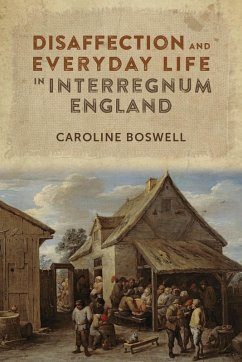A look at how ordinary English men and women responded to the transformations that accompanied the regicide, the creation of a republic, and the rise of the Cromwellian Protectorate.
How did ordinary English men and women respond to the transformations that accompanied the regicide, the creation of a republic, and the rise of the Cromwellian Protectorate? This book uncovers grassroots responses to the tangibleconsequences of revolution, delving into everyday practices, social interactions, and power struggles as they intersected with the macro-politics of regime change. Tussles at local alehouses, encounters with excise collectors inthe high street, and contests over authority at the marketplace reveal how national politics were felt across the most ordinary of activities.
Using a series of case studies from counties, boroughs, and the London metropolis, Boswell argues that factional discourses and shifting power relations complicated social interaction. Localized disaffection was broadcast in newsbooks, pamphlets, and broadsides, shaping political rhetoric that refashioned grassroots grievances to promote royalist desires. By uniting disparate people who were alienated by the policies of interregnum regimes, this literature helped to create the spectre of a unified, royalist commons that materializedin the months leading up to Charles II's Restoration. Such agitation - from disaffected mutters to ritualistic violence against officials - informed the broad political culture that shaped debates over governance during one of the most volatile decades in British history.
CAROLINE BOSWELL is Associate Professor in History at the University of Wisconsin, Green Bay.
How did ordinary English men and women respond to the transformations that accompanied the regicide, the creation of a republic, and the rise of the Cromwellian Protectorate? This book uncovers grassroots responses to the tangibleconsequences of revolution, delving into everyday practices, social interactions, and power struggles as they intersected with the macro-politics of regime change. Tussles at local alehouses, encounters with excise collectors inthe high street, and contests over authority at the marketplace reveal how national politics were felt across the most ordinary of activities.
Using a series of case studies from counties, boroughs, and the London metropolis, Boswell argues that factional discourses and shifting power relations complicated social interaction. Localized disaffection was broadcast in newsbooks, pamphlets, and broadsides, shaping political rhetoric that refashioned grassroots grievances to promote royalist desires. By uniting disparate people who were alienated by the policies of interregnum regimes, this literature helped to create the spectre of a unified, royalist commons that materializedin the months leading up to Charles II's Restoration. Such agitation - from disaffected mutters to ritualistic violence against officials - informed the broad political culture that shaped debates over governance during one of the most volatile decades in British history.
CAROLINE BOSWELL is Associate Professor in History at the University of Wisconsin, Green Bay.
Dieser Download kann aus rechtlichen Gründen nur mit Rechnungsadresse in A, D ausgeliefert werden.


